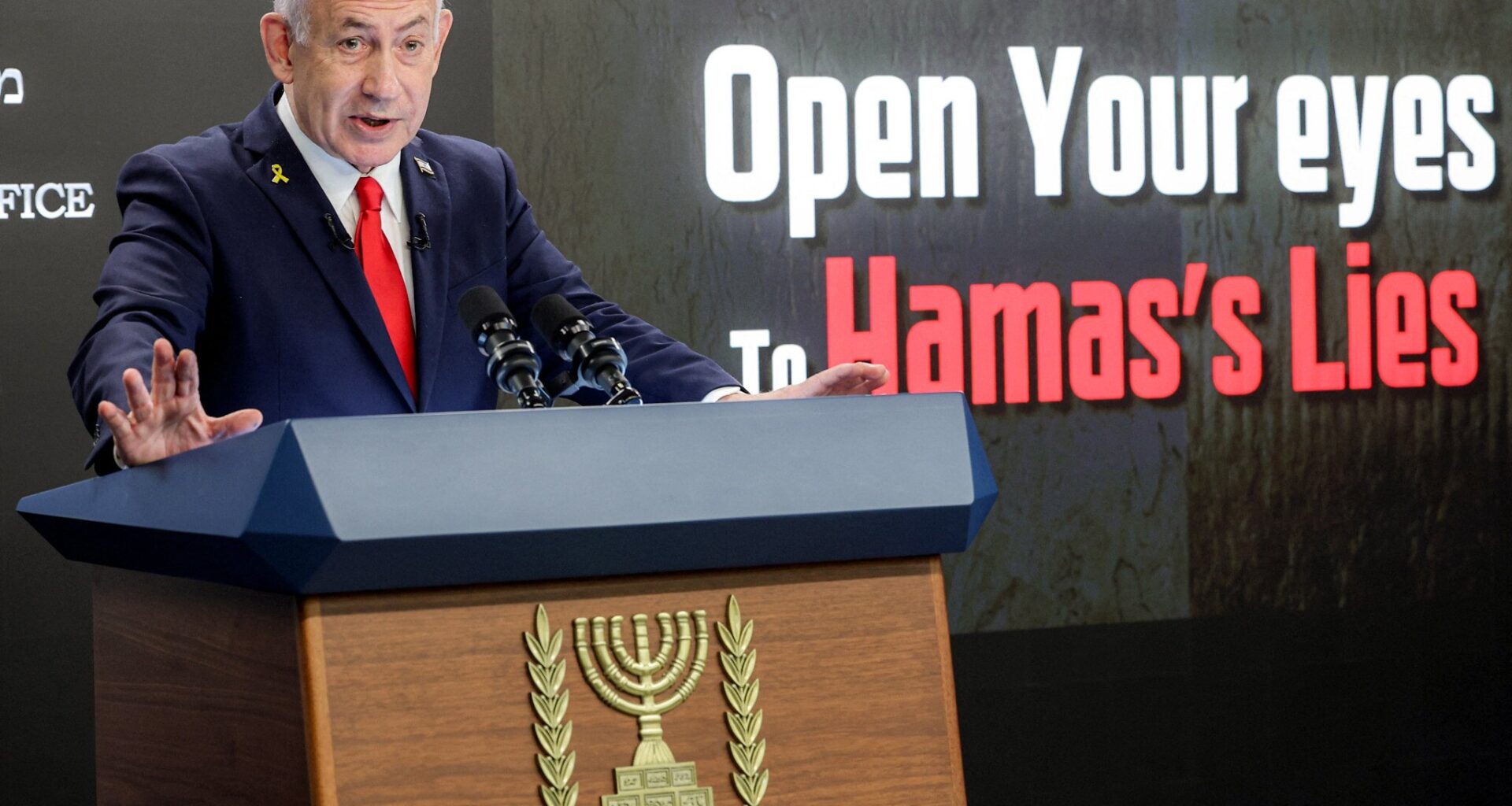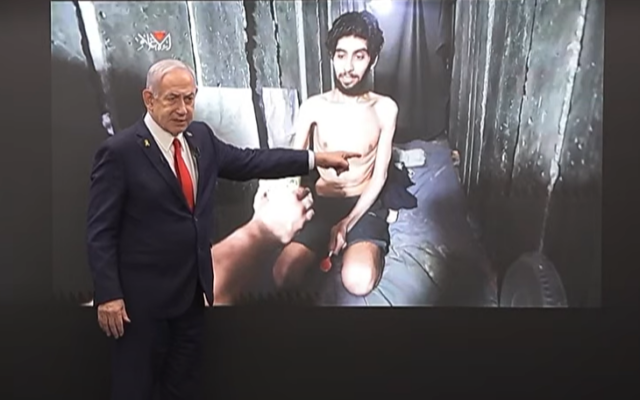Prime Minister Benjamin Netanyahu gave a rare press conference to foreign media on Sunday at which he laid out Israel’s plans for the continuation of its war against Hamas in the Gaza Strip and sought to dispel the “global campaign of lies” about Israel’s conduct, as criticism continues to mount after nearly two years of conflict.
He later gave a second lengthy press conference in Hebrew to local media, during he said he wanted to end the war in Gaza as soon as possible, but that his plan to expand the conflict and capture Gaza City was the only way to secure the release of all 50 hostages still held in the Strip.
Days after his cabinet approved a new major offensive in Gaza City to root out Hamas forces there, the premier denied that Israel intends to occupy Gaza. He described how a future “civilian administration” would be established in the Strip to govern Palestinians in a manner that does not threaten Israel.
As security forces and hostages’ families decry the Gaza City plan as potentially endangering the hostages’ lives, Netanyahu argued that an Israeli takeover of Gaza would in fact enable their release.
The prime minister also lashed out at foreign media for buying into Gaza starvation claims, saying the allegations were largely a “fake” Hamas campaign that the world had fallen for “hook, line and sinker.” He said the three most “celebrated” cases of ostensible Israeli-imposed starvation were all false, and gave details of each.
Get The Times of Israel’s Daily Edition
by email and never miss our top stories
By signing up, you agree to the terms
He also claimed the belief by some world leaders that Palestinian statehood would solve the region’s problems was “absurd,” insisting that “Palestinians are not about creating a state; they’re about destroying a state.”
And the Israeli leader charged that in imposing a partial arms embargo on Israel, German Chancellor Friedrich Merz had “buckled” under pressure from foreign and domestic groups opposing Israel.
“The war can end tomorrow”
Opening the first, English-language press conference at his Jerusalem office with a prepared statement, Netanyahu said he had convened it “to puncture the lies and tell the truth.”
“Our goal is not to occupy Gaza. Our goal is to free Gaza, free it from Hamas terrorists,” Netanyahu said. “The war can end tomorrow if Hamas lays down its arms and releases all the remaining hostages.”
Describing his five-point postwar vision for the Strip, Netanyahu said: “Gaza will be demilitarized; Israel will have overriding security responsibility; a security zone will be established on Gaza’s border with Israel to prevent future terrorist incursions; a civilian administration will be established in Gaza that will seek to live in peace with Israel.”
“That’s our plan. Given Hamas’s refusal to lay down its arms, Israel has no choice but to finish the job and complete the defeat of Hamas,” he said.
The Palestinian Authority is not an acceptable option for a role in post-war Gaza, Netanyahu added, accusing it of promoting terrorist activity against Israel. Later, in his Hebrew event, he said the PA ultimately shared the same goal as Hamas of destroying Israel, but sought to do so by first using international bodies such as the UN and International Criminal Court to force an Israeli retreat to “indefensible boundaries,” and then to attack.
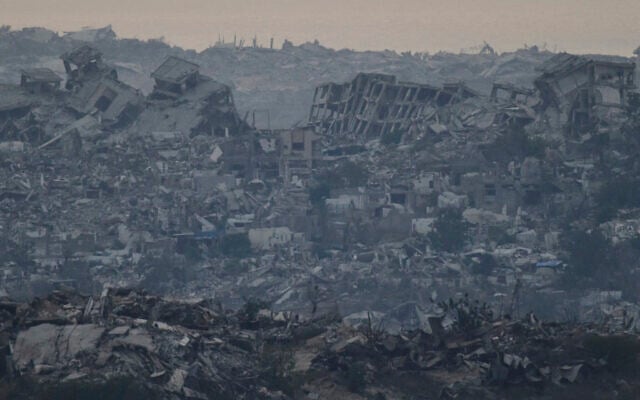
Buildings that were destroyed during the Israeli ground and air operations stand in the northern Gaza Strip as seen from southern Israel, August 8, 2025. (AP Photo/Leo Correa)
Netanyahu said the IDF had been instructed “to dismantle the two remaining Hamas strongholds in Gaza City and the central camps.” Israel will begin the plan “by first enabling the civilian population to safely leave the combat areas to designated safe zones. In these safe zones, they’ll be given ample food, water, and medical care,” he said.
Speaking later to Israeli journalists, Netanyahu said Hamas “has raised impossible conditions — not only in our view, but also in the view of the United States,” for a deal. “They include, among other things, a complete withdrawal from the Gaza Strip — including from the Philadelphi Corridor — which would allow the free smuggling of weapons; the release of imprisoned terrorists, these monsters; and a demand for binding international guarantees that would prevent the IDF from resuming combat. These are terms of surrender that no responsible government would agree to accept — and certainly I will not accept them.”
“Hamas has deceived us. Therefore, I have become convinced that the only way to return all our hostages is to defeat Hamas,” said Netanyahu.
Nonetheless, he went on, “I want to end the war as quickly as possible. That is why I have instructed the IDF to shorten the timetable for taking control of Gaza City,” he said, without elaboration, adding, “I do not intend to perpetuate Hamas — I intend to defeat Hamas… I don’t intend to leave those monsters in their place.”
He said the cabinet decision to conquer Gaza City last week “is the first step” in the push for the battlefield defeat of Hamas.”
“The minute you collapse the center of gravity [by capturing Gaza City], the last true fortress left to Hamas in Gaza, Hamas falls apart,” he argued. “I think Hamas thinks so too.”
He later acknowledged, however, that even after the Gaza City takeover, Israel will have to stage another operation to clear the central Gaza camps. However, he declines to elaborate, in order, he said, to avoid tipping off Hamas.
Addressing humanitarian concerns, Netanyahu said, “Our policy throughout the war has been to prevent a humanitarian crisis, while Hamas’s policy has been to create it.”
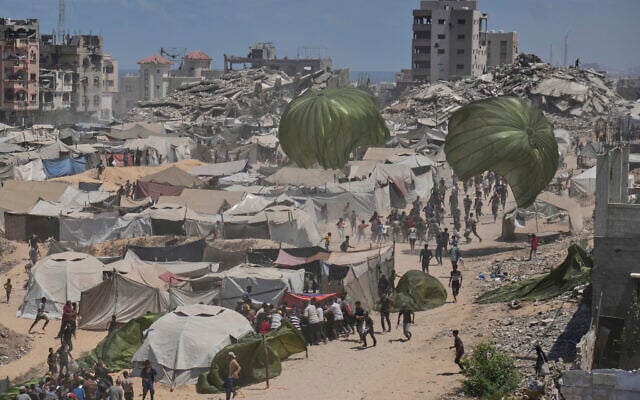
Palestinians rush to collect humanitarian aid airdropped by parachutes into Gaza City, northern Gaza Strip, August 7, 2025. (AP Photo/Jehad Alshrafi)
Turning to allegations that the IDF enforced a starvation policy in Gaza, Netanyahu insisted that Israel allowed sufficient aid in throughout the war, while Hamas has disrupted aid flow and the United Nations has failed to properly distribute it.
Since the beginning of the war, Israel has let in “close to 2 million tons of aid,” he said. “If we had a starvation policy, no one in Gaza would have survived after two years of war. But our policy has been the exact opposite.”
He said Hamas has “violently looted the aid trucks” and deliberately created shortages. Because the UN was unwilling to deliver all of it, he claimed, tons and tons of humanitarian aid sat rotting on the Gaza side of the border. Now Israel was designating safe corridors for aid distribution, boosting safe distribution points managed by the Gaza Humanitarian Foundation, and arranging air drops by Israel and others.
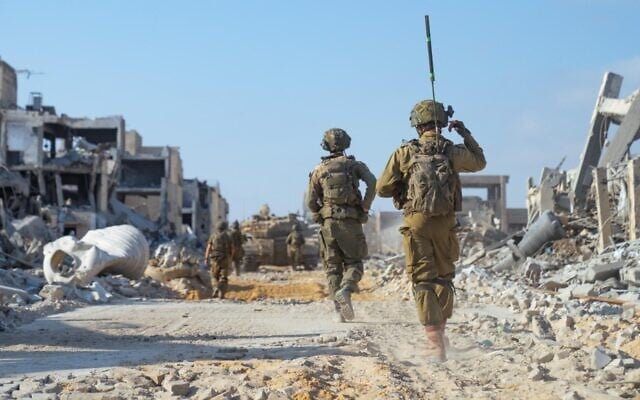
IDF troops are seen operating in the Gaza Strip in an image published by the military on August 8, 2025. (Israel Defense Forces)
‘Global campaign of lies’
Netanyahu blamed Hamas and the international media for promoting false allegations of Israeli-imposed starvation in Gaza — describing a “global campaign of lies.”
While 2 million people in Gaza are now getting access to humanitarian aid, “the only ones who are being deliberately starved in Gaza are our hostages,” he said.
He showed a still of the emaciated Israeli hostage Evyatar David, as seen in a recent Hamas propaganda video. “Look at his hand, at his arm. He is being deliberately starved by these Hamas monsters,” said Netanyahu, pointing also to the seemingly healthy arm in the shot of one of the Hamas captors who, he claimed, was clearly “eating well.”
Prime Minister Benjamin Netanyahu points to a still from a Hamas propaganda video showing emaciated hostage Evyatar David, at a press conference on August 10, 2025. (GPO screenshot)
He highlighted images of three allegedly malnourished Gaza children that have gone viral and have been featured in media throughout the world, saying these were “fake” photos of children who all had preexisting health conditions.
First, he referred to 5-year-old Osama al-Rakab, who suffers from a serious “genetic disease” and who underwent treatment in Italy “because Israel got him out.” Second, he pointed to Abdul Qader al-Fayoumi, who reportedly died of starvation in Gaza, saying the teen suffered from “a genetic neurological disorder,” and noted that he was treated in Israel in 2018, but that his disease defies most treatments.
Finally, he turned to what he called the “most celebrated” case — a New York Times front-page photograph showing Muhammad Zakaria Ayoub al-Mutawaq and his mother. He said Muhammad suffers from cerebral palsy, and noted that “his mother is well fed and his brother is healthy.”
“I’m looking right now into the possibility of a governmental suit against the New York Times because this is outrageous,” Netanyahu said, noting that the New York Times later issued a correction regarding the story, but saying it had “buried” it.
“These are the three most celebrated photos, and they’re all fake,” he fumed. “We won’t allow it to go unchallenged.”
While the photos of al-Mutawaq failed to mention the serious illness he suffers from, senior Israeli doctors have said his severely emaciated state is not the result of his preexisting condition alone, and that it is likely exacerbated due to an inability to access proper nutritional supplements.
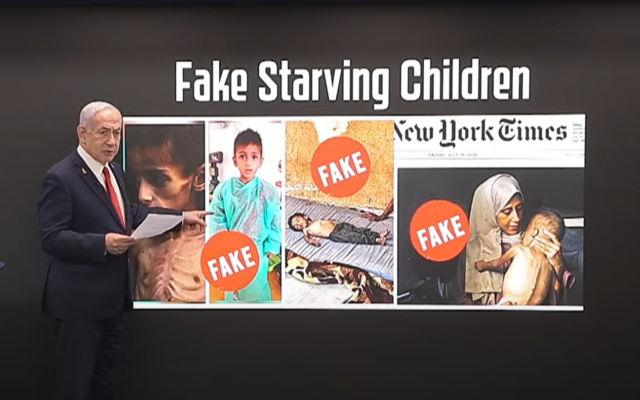
Prime Minister Benjamin Netanyahu details the cases of three Gaza children whose medical conditions he says have been misrepresented internationally as caused by Israeli-imposed starvation, at a press conference on August 10, 2025. (Left to right): Osama al-Rakab; Abdul Qader al-Fayoumi; Mohammad Zakaria Ayoub el-Mutawaq. (GPO screenshot)
While the premier denied that Israel is deliberately starving Gazan civilians, he conceded that the people of the Strip have experienced “deprivation” and said the new surge of aid was meant to address this.
“I don’t know of a country that texts millions of messages to civilians to get out of harm’s way, giving up the element of surprise, or calling them individually on the cellphones,” he went on. “Yet Israel is accused of genocide. It’s absurd.”
Addressing near-daily reports of civilian casualties from Israeli fire near aid sites, Netanyahu alleged that “a lot of the firing was done by Hamas, seeking to [prompt a] response by our forces.” And “very often,” IDF forces did not respond, he claimed: “They stood back, they held their fire, even though their own lives were on the line.”
The United Nations has said more than 1,300 people have been killed trying to obtain aid supplies in the enclave since the Gaza Humanitarian Foundation began operating in May, most of them shot by Israeli forces operating near GHF sites.
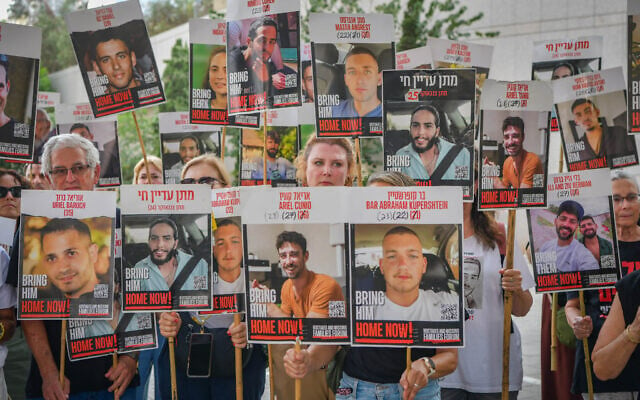
Families of Israelis held hostage in Gaza, former hostages and supporters hold a press conference in Tel Aviv, on August 9, 2025. (Avshalom Sassoni/Flash90)
Netanyahu was asked at about the Integrated Food Security Phase Classification (IPC) report on the specter of famine in Gaza, on Israel’s 11-week blockade on aid between March and May, and on how he can guarantee that “disaster will not happen when you have a million more people displaced” under the Gaza City operation.
“We tried to do two things simultaneously. Stop the trucks and bring in the trucks through the [Gaza Humanitarian Foundation] distribution points,” Netanyahu responded.
However, the two actions were not taken simultaneously. Israel maintained a complete aid blockade over Gaza for 78 days from March 2 until May 19. Only then did it begin allowing a small amount of aid into Gaza through existing, largely UN-facilitated mechanisms before the GHF gradually began operating as many as three distribution sites in southern and central Gaza.
“It wasn’t successful… among other things because Hamas interdicted also the GHF program, the distribution point,” he said.
But GHF has long asserted that Hamas or any other body has not been able to loot any of its aid. In June, the IDF published footage of what it claimed was a Hamas operative shooting at Gazan aid seekers. But that video was not filmed near a GHF site.
In his subsequent Hebrew press conference, Netanyahu added that the other problem plaguing the GHF’s rollout was the lack of distribution sites. GHF for months has said that it was urging Israel to allow it to establish an additional site in northern Gaza; but those calls apparently went unanswered.
“Hamas used [stolen aid] as a recruitment tool for new terrorists, telling a Palestinian woman, ‘You want this flour? Give me your 15-year-old son.’ That’s how they sustain their war machine,” he said to the Israeli reporters.
“We didn’t want to cause hunger; the opposite, we want to get around the looting and robbery of Hamas,” he continued, though acknowledging that the GHF framework “didn’t work as we wanted it to.”
“There wasn’t starvation,” Netanyahu said. “There was a shortage; there certainly wasn’t a policy of starvation.”
Still, Netanyahu ventured some criticism of the policy he and his government chose, saying: “We can argue about whether [changing the policy] was too late, but we certainly shouldn’t have let ourselves be caught in that situation.”
‘Creative’ methods of returning hostages
Netanyahu claimed, without elaborating, that the military plan to take over Gaza City could aid efforts to retrieve the remaining living and dead hostages in the Strip — most of whom are believed to be held in the central Strip area — through “various” and “creative” methods.
Israel’s top security officials, including IDF Chief of Staff Lt. Gen. Eyal Zamir, Mossad chief David Barnea, and National Security Adviser Tzachi Hanegbi are all said to believe that conquering Gaza City will endanger the hostages.
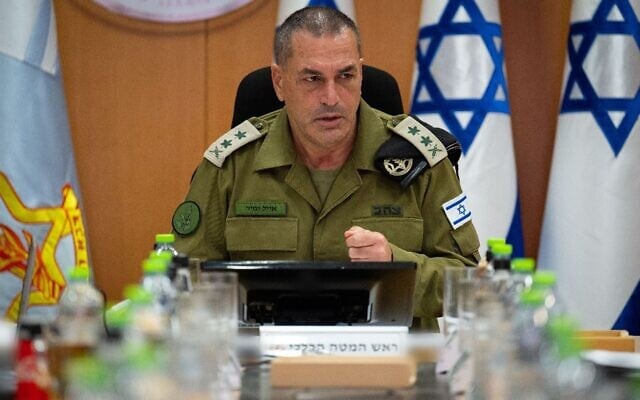
IDF Chief of Staff Lt. Gen. Eyal Zamir speaks during a security assessment on August 7, 2025. (Israel Defense Forces)
Netanyahu insisted that he does “not want to prolong the war,” saying, “I want to end the war. I think the other suggestions [for future actions in Gaza] would have prolonged it.”
In response to a question at the press conference for local media on whether he would agree to a partial hostage release deal if Hamas agrees to one after the operation begins, Netanyahu did not answer directly, replying instead that he is “committed to…the release of all 20 of our hostages, and the defeat of Hamas is the decisive operation that I believe will achieve that.” Several times during this Hebrew press conference, the prime minister referred to the imperative to secure the release of the “20” hostages, rather than all 50.
‘Transitional authority’
Turning to a post-war Gaza, Netanyahu said Israel has identified “several candidates” for a “transitional authority” to govern Gaza after the war, stressing that Hamas disarmament would come first in any postwar plan and that Israel does not seek to remain in the Strip.
Multiple Arab countries agree with Israel on the requirement for Hamas disarmament, he claimed.
“There are several candidates that we’re talking about, several constructs,” he continued. But “no one’s going to go in there unless we finish Hamas.”
He emphasized that “we don’t want to stay in Gaza, that’s not our purpose,” adding that he makes this clear even “to those who disagree with me” — likely referring to far-right members of his coalition who openly call for permanent occupation of Gaza.
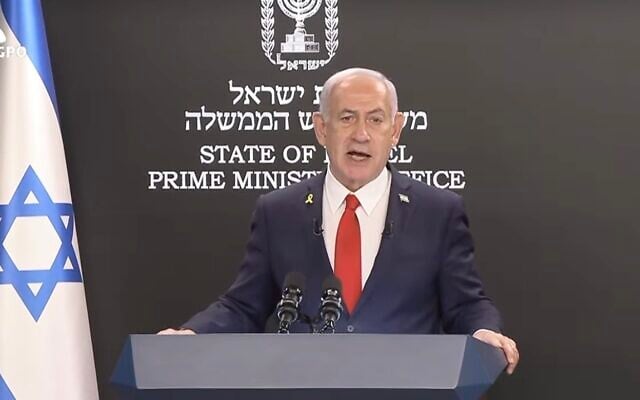
Prime Minister Benjamin Netanyahu holds a press conference for foreign media, on August 10, 2025. (GPO screenshot)
Israel will fight ‘with or without the support of others’
Asked about international criticism of Israel, Netanyahu said that German Chancellor Merz has “been a good friend of Israel, but I think he’s buckled under the pressure of false TV reports, the internal pressure from various groups.”
Referring to world leaders in general, he said, “Maybe some choose to forget October 7. We will not forget what happened, and we will do whatever it takes to defend our country and defend our people, defend our future. We will win the war, with or without the support of others.”
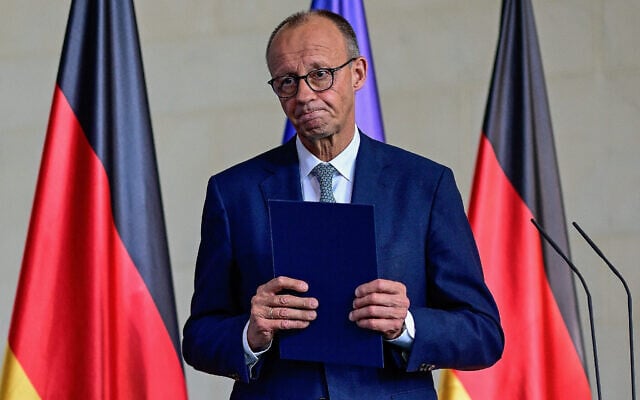
German Chancellor Friedrich Merz leaves after making a statement to journalists following a meeting of the security cabinet of the German government at the Chancellery in Berlin on July 28, 2025. (John MACDOUGALL / AFP)
Netanyahu asserted that in fact, many leaders, “especially European leaders,” have told him: “Look, we know you’re right, but we can’t stand in the face of the public opinion in our country…They tell me that over and over again.”
“And I say, that is your problem. It is not our problem,” he said.
Recognition? Absurd
Asked about the recent wave of Israel’s Western allies committing to recognize a Palestinian state and his description of such action as “rewarding terror,” the premier said: “Palestinians are not about creating a state, they’re about destroying a state.”
“The prevailing assumption… [is] that the problem that we have with the Palestinians is the absence of a Palestinian state. And [that] if they were given a Palestinian state, they would stop the efforts to destroy the Jewish state,” he said. “But the Palestinians were offered a state many times, including in the partition resolution, and they turned it down,” he said. “They were offered statehood by my predecessors, with lavish, lavish concessions. They turned it down.”
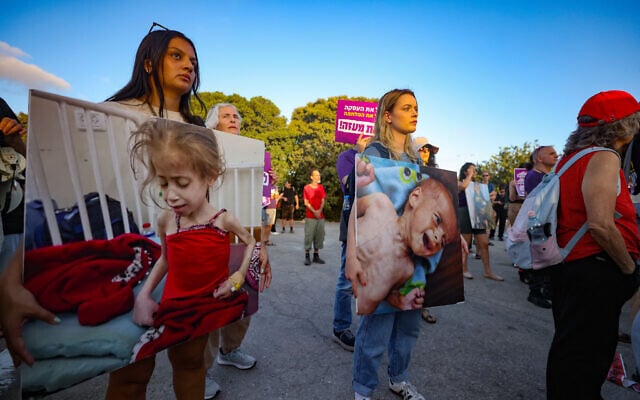
People protest against the war in Gaza near the Israeli border with the Gaza Strip, calling attention to accounts of hunger, August 6, 2025. (Jamal Awad/Flash90)
“It defies imagination or understanding how intelligent people around the world, including seasoned diplomats, government leaders, and respected journalists, fall for this absurdity,” he stated.
Hamas had a de facto state in Gaza, he added, which it used “to launch a war of terror against Israel,” and will do so again if it is able. As for the Palestinian Authority, he went on, it seeks first to reduce Israel to “indefensible boundaries” via international organs “and then deliver the blow. Because Israel is too strong in its present configuration.”
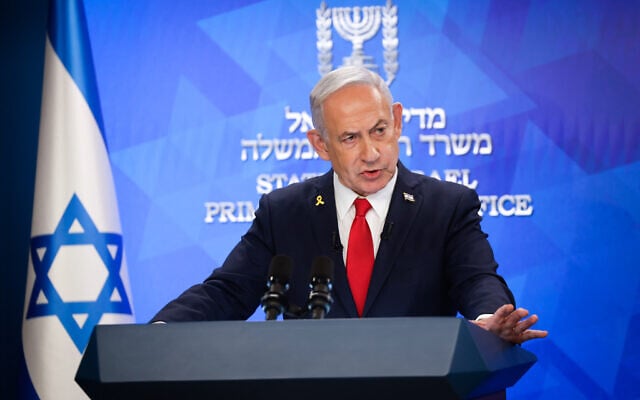
Prime Minister Benjamin Netanyahu holds a press conference at the Prime Minister’s Office in Jerusalem, on August 10, 2025. (Yonatan Sindel/ Flash90)
“The real reason that this conflict persists is not because of the absence of a Palestinian state, but the persistent Palestinian refusal to recognize the Jewish state in any boundary,” he charged.
The Palestinians should have “all the powers to govern themselves in the places where they live and none of the powers to threaten Israel,” he said. “If they want to live here, next to us, they have to stop seeking our destruction.”
“That’s something that today, the Israeli public forcefully opposes,” he noted. Most of the Jewish public and the vast majority of MKs oppose a Palestinian state “for the simple reason that they know it won’t bring peace.
“To have European countries and Australia march into that rabbit hole… and buy this canard, it is disappointing. And I think it’s actually shameful.” But, he vowed, “it’s not going to change our position.
